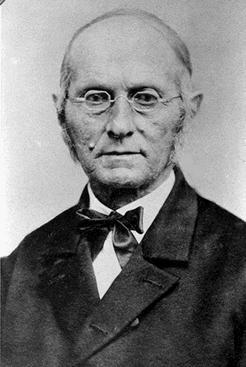Young Horse Tamed: Angelic Influence Illustrated
by John Loughborough, as told by Joseph Bates and James White
In the Bible we have numerous accounts of the power and influence
of angels. Ferocious animals have been tamed by their presence,
as in the case of the hungry lions when Daniel was thrown into
their midst. Those lions were calmed by the presence of an angel,
and became as peaceable as domestic animals.
 |
 |
| Joseph Bates—White Estate. |
|
By way of comparison, we cite an instance where the influence
of the angel who is ever present when Mrs. White is in vision,
calmed the temper of an unruly, vicious horse. In the fall of
1846 Elder and Mrs. White wished to go from Topsham to Poland,
Maine, a distance of about thirty miles. Elder White obtained
the use of a partly-broken colt, and a two-seated market-wagon,
which was constructed without a dashboard. There was a step
across the front of the wagon, and an iron step from the shafts.
It was necessary that extreme care be taken in driving the colt;
for if the lines or anything touched his flanks, he would instantly
kick furiously; and he had to be held in continually with a "taut
rein" to keep him from running. The owner of this colt lived in Poland.
As Elder White had been used to managing unbroken colts, he
thought he would have no serious trouble with this one. Had
he known, however, that during its frantic demonstrations it
had previously killed two men, one by crushing him against the
rocks by the roadside, he might have been less confident.
On this occasion there were four persons in the wagon, — Elder
White and his wife on the front seat, and Elder Bates and a Mr.
Israel Damon on the back seat. While Elder White was giving
his utmost care to keep the horse under control, Mrs. White was
conversing about the truth, when suddenly the power of God came
down upon the company, and she was taken off in vision while
seated in the wagon. The moment she shouted, "Glory!" as she
went into vision, the colt stopped perfectly still, and dropped
his head, looking like a sleepy old horse. At the same time,
Mrs. White arose, and, with her eyes turned upward, stepped over
the front of the wagon, down onto the shafts, with her hand on
the colt's haunches. Elder Bates called out to Elder White,
"The colt will kick that woman to death." Elder White replied,
"The Lord has the colt in charge now; I do not wish to interfere."
The colt stood as quietly as an old horse. By the roadside
was a bank about six feet high, and beyond, next the fence, was
a grassy place. Elder Bates said that the bank was steeper than
the roof of a house, and that they could not ascend it. Mrs. White, with
her eyes still upward, not once looking down, went up the bank
as readily as if she was going up a flight of stairs. She walked
back and forth on the grass-plot for a few minutes, describing
the beauties of the new earth. Then, with her eyes in the same
posture, she came down the bank, and walking up to the wagon,
stepped upon the step of the shafts, again laying her hand on
the colt. She then stepped on the shafts, and into the wagon.
The moment she sat down upon the seat, she came out of the vision;
and that instant the horse, without any indication from the driver,
started up, ready to go on his way, but completely tamed.
While Mrs. White was out of the wagon, Elder White thought
he would test the horse, and see if he were really tame. At
first he just touched him with the whip; at other times the horse
would have responded with a kick, but he did not move. Elder
White then struck him quite a blow, then harder, and still harder.
The colt paid no attention whatever to the blows, but seemed
as harmless as the lions whose mouths the angel shut the night
Daniel spent in their den. "It was a solemn place," said Elder
Bates, "and it was evident that the same power that produced
the vision, for the time being subdued the wild nature of the
colt." They had no more trouble with the colt in completing
the journey. This I have stated as related to me by Elders Bates
and White.
(The Prophetic Gift in the Gospel Church, pages pp. 54-56.)
|



